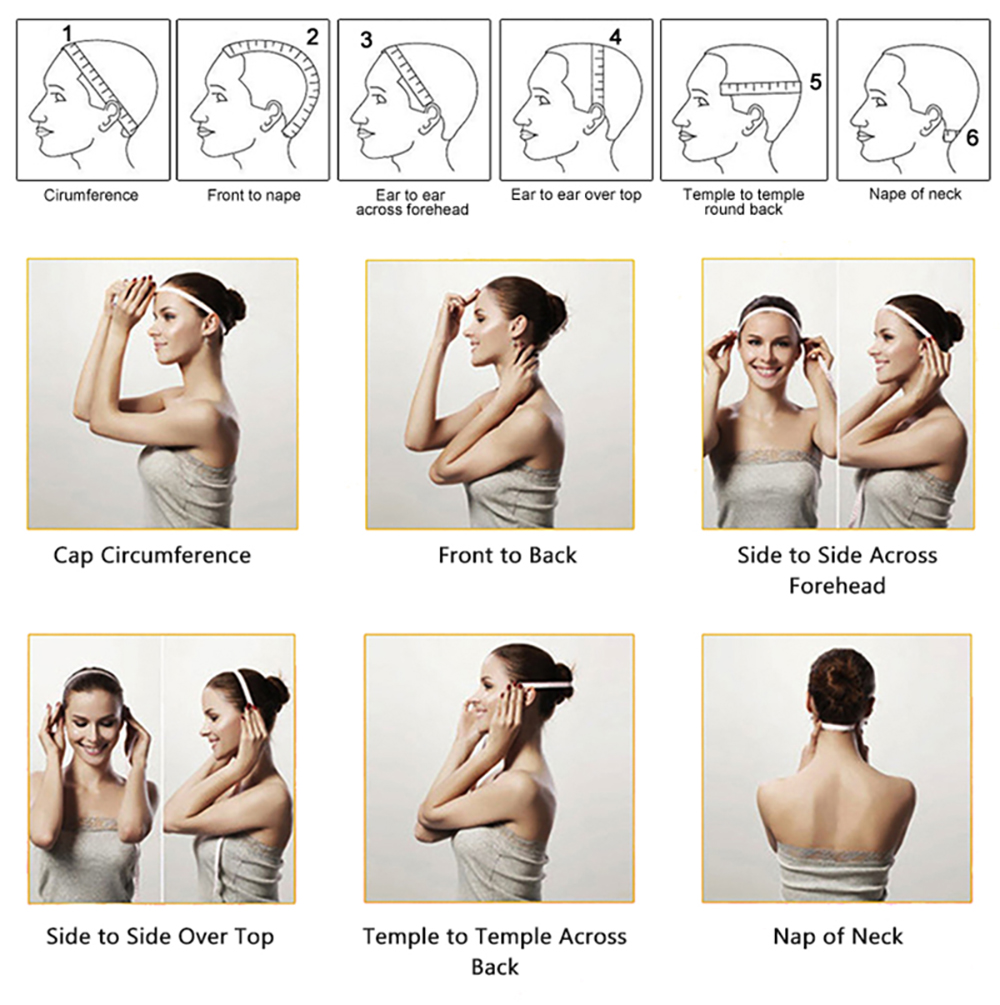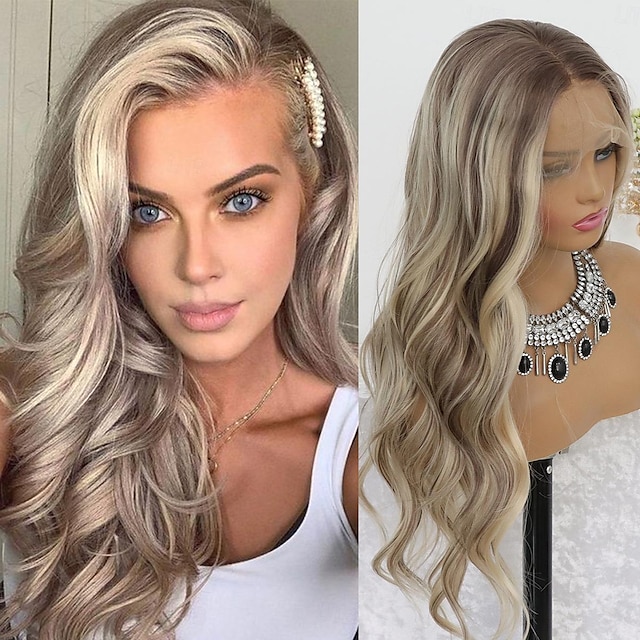Remy Human Hair 13x4 Lace Front Wig Free Part Peruvian Hair Body Wave Blonde Multi-color Wig 150% Density with Baby Hair Ombre Hair Highlighted / Balayage Hair Glueless Pre-Plucked For wigs for black
#13735068Copyright Violation Instructions
Please note:
When you choose pictures that need to be customized, you must ensure not to violate any copyrighs. If, after the completion of the customization, any copyright infringement problems should occur, we cannot be held responsible for those. Please make sure you agree to our Terms and Conditions. If you do not have any further questions you can click OK to continue shopping. Thanks again for choosing to shop with us.
Please make sure you agree to our Terms and Conditions.
Measurement Tips for Wig Cap:

Selling Points
Specifications
Photos
Size Chart
| Cap Size | Cap Circumference | Front to Back | Side to Side Across Forehead | Side to Side Over Top | Temple to Temple Across Back | Nape of Neck |
|---|---|---|---|---|---|---|
| Average | 56.5 | 37 | 32 | 32.5 | 38 | 14 |
Learn More About This Product
(1).jpg)
.jpg)
Frequently Asked Questions
-
Q: What is the difference between human hair and synthetic hair?
A: A human hair wig is longer lasting, soft and feels natural to the touch. It can be styled and dyed just like your own hair and "breathes" so your scalp won't perspire as much underneath. But human hair wigs need to be styled after every wash, and are more expensive because of its limited supply. A synthetic hair wig is easy to care for without requiring styling after washing, and is less expensive than human hair. However, it cannot take high temperatures, meaning it cannot be styled with an iron, and has a shorter lifespan if you wear it every day.
-
Q: What are the different types of wig caps?
A: Capless is one of the most common types of wigs. The base of any wig is referred to as a cap. The hair is attached to the wig cap using a variety of techniques to achieve different looks. On most wigs, hair is attached in "wefts." These are strips of hair doubled over and sewn closely together in long strands.
Monofilament caps use a gauze-like, nearly transparent material that each hair section is hand-knotted onto. This kind of wig can be styled more easily and can ventilate your scalp to avoid heat and moisture buildup. The thin cap material is difficult to detect and therefore very natural-looking. Monofilament wigs are specially designed for those with thinner hair or sensitive skin. Lace wigs use a piece of mesh lace just beyond the front hairline of the wig, which each hair section is attached to. These can be temporarily glued to the skin around the hairline to make the lace cap nearly invisible. Mesh lace allows for natural-looking partings in the hair, as well as weeks of wear at a time, even during swimming or sports. All lace wigs need periodic maintenance and can last for six months or longer. There are two types of lace wigs: front lace and full lace : Full lace wigs have lace material all around and can be parted anywhere on the scalp for greater breathability and comfort. Front lace wigs have lace material at the forehead only and are more natural and undetectable. Unfortunately, these wigs cannot be pulled back into a ponytail. -
Q: How do I put on a wig?
A: After removing your wig from the box, take off the protective hairnet (if the style has one) and give it a good shake. If it is a ready-to-wear synthetic hair, you are ready to go! If it requires customization (such as trimming a lace front), we recommend you consult a hair stylist. Check out our salon locator to find local salons familiar with wearable hair.
If you have a lot of your own hair, the first step is to gather it back and up. One great trick is to separate hair into two sections on each side of your head. Twist the hair as you pull it back and around the head so that it will eventually lay flat. This tactic can help avoid a pony tail bulge. You may choose to use pins, braids, wig caps (recommended). A wig cap can be helpful even without hair to keep wigs secure and in place. Hold your wig at the sides and starting at the front, place it at your natural hairline. Slide it on toward the nape of your neck .Adjustable straps at the nape may help to achieve a more secure fit. If handling a lace front wig, take care not to tug on the lace as it can be a bit delicate. Don't worry if it doesn't look perfect right away, start styling -
Q: How should I care for a wig?
A: When not in use, store your wig on a mannequin or wig stand to maintain its shape and wash only when necessary (roughly once every 10-14 days of wear but more often if your lifestyle or environment calls for it).
-
Q: Are color swatches 100% accurate?
A: Hair color images are presented to give you a visual representation of color options for each item. However it must be noted that on screen representations do not necessarily precisely represent actual colors due to variable monitor calibrations. Additionally, the computer or device you use may have an impact on how colors appear. -
Q: Can I use low heat to style my wig?
A: Unfortunately, any heat styling runs the risk of damaging synthetic wigs. Wigs with synthetic hair can be purchased pre-curled or in any style you desire. Alternatively, you could curl the wig with a styling method that does not involve heat. Wigs with human hair will not be damaged by heat styling.
-
Q: Can I color or straighten the hair in this wig?
A: Wigs made with human hair can be colored or styled as you would your own hair. Synthetic wigs can’t be colored, heat styling of any kind could be damaging to the fibers.
-
Q: How long can I expect this wig to last, and can I wear it to swim or play sports?
A: Typically, hair wigs can last up to a year or longer. Lace wigs should last up to three to six months, depending on how often they are worn and how they are cared for. We do not recommend touching water. It can put too much stress on the hair and create unmanageable tangles. Also, pool chemicals and salt can damage the hair and affect color.
- Q: How do I adjust the wigs to fit my head?
A: The adjustable elastic band inside the wig can help you get a secure, comfortable and close fit.
- Q: What is the difference between your Brazilian virgin hair, Malaysian virgin hair, Peruvian virgin hair, Chinese virgin hair and Indian virgin/Remy hair?
A: There are quality differences among these hair types. Hair quality from normal to best is Brazilian virgin hair =Malaysian virgin hair >Chinese virgin hair=Peruvian virgin hair>Indian virgin/Remy hair. The best quality means the wig can last longer and you will feel the hair is more smooth and softer when you touch it. But that doesn't mean the Indian virgin/Remy hair is bad, no, it is still good just normal compared with other hair types .
- Q: What does Density refer to?
A:The density refers to how thick the hair is and what density you order is really based on personal choice. Most women achieve a natural appearance with light to medium or medium density; however, your choice will depend on your styling preferences and individual profile. - Q:What is Yaki Texture and what is the difference between Yaki and Silky?
A:Yaki texture is processed from the silky texture .T he process make hairs feel coarser than normal silky texture hair,b ut still look straight .Yaki texture is close to the relaxed hair texture of black women. - Q:What is the difference between Swiss lace & French lace?
A:Swiss lace is finer and softer than French lace. Swiss lace is with better and natural looking to match the skin. French lace is a bit thicker and more durable for use. Both two types of laces can be dyed to match different skins.
How to Measure
Measurement Tips for Wig Cap:

Report Copyright Infringement
Report Copyright Infringement
Successful Submit!
Thank you for submitting this report We will process as soon as possible
Item Added Successfully








